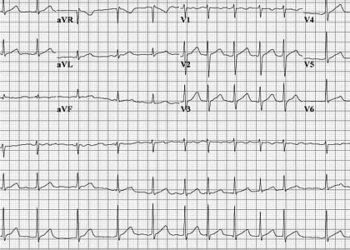Omecamtiv mecarbil not associated with improved exercise capacity compared with placebo in patients with chronic heart failure with reduced ejection fraction
1. In this randomized controlled trial, among 276 patients with chronic heart failure with reduced ejection fraction, omecamtiv mecarbil did not significantly improve exercise capacity over 20 weeks compared with placebo when added to standard therapy.
2. These results do not support the clinical use of omecamtiv mecarbil as management for heart failure with reduced ejection fraction for improvement of exercise capacity.
Evidence Rating Level: 1 (Excellent)
Study Rundown: The prevalence of heart failure continues to grow, affecting more than 64 million patients globally at present. Of these patients, approximately half have heart failure with a reduced left ventricular ejection fraction (HFrEF). A cardinal manifestation of HFrEF is exertional intolerance, even in stable patients. Omecamtiv mecarbil is a selective cardiac myosin activator known to improve cardiac performance and reduce the risk of cardiovascular events in patients with HFrEF. This randomized controlled trial investigated whether omecamtiv mecarbil improved peak exercise capacity in patients with chronic HFrEF. A total of 296 patients were included in this study and were randomized to receive either placebo (n=91) or omecamtiv mecarbil (n=185), given orally twice daily at a dose of either 25 mg, 37.5 mg or 50 mg based on target plasma levels, over the course of 20 weeks. The primary outcome of this study was a change in exercise capacity (peak Vo2) between baseline and week 20. Secondary outcomes included total workload, ventilatory efficiency, and daily physical activity. The change in exercise capacity (peak Vo2), for patients on omecamtiv mecarbil or placebo over 20 weeks was -0.24 vs 0.21 mL/kg/min respectively, a difference not found to be statistically significant. A major limitation to this study was the exclusion of patients with recent clinical instability, which led to the enrollment of patients with less severe HF compared with previous studies of omecamtiv mecarbil which may have limited the ability of this study to demonstrate improvements in exercise capacity.
Click to read the study in JAMA
Click to read an accompanying editorial in JAMA
Relevant Reading: Improving exercise capacity and quality of life using non-invasive heart failure treatments: evidence from clinical trials
In-Depth [randomized controlled trial]: This study investigated whether omecamtiv mecarbil, a direct myosin activator, could improve peak exercise capacity in patients with chronic HFrEF. A total of 296 patients (median age, 64 years; IQR, 55-70 years; 42 women [15%]), 249 (90%) were randomized 2:1 to receive either omecamtiv mecarbil (n=185) or matching placebo (n=91). The primary endpoint of this study was a change in exercise capacity (peak Vo2), and secondary endpoints included total workload, ventilatory efficiency, and daily physical activity. The median left ventricular ejection fraction was 28% (IQR, 21-33) and the median baseline peak Vo2 was 14.2 mL/kg/min (IQR, 11.6-17.4) in the intervention group and 15.0 mL/kg/min (IQR, 12.0-17.2) in the placebo group. The change in exercise capacity over 20 weeks was -0.24 vs 0.21 mL/kg/min, a difference that was not statistically significant. The least square mean (LSM) treatment difference between omecamtiv mecarbil and placebo was -0.45 mL/kg/min, favoring placebo (95% CI, -1.02 to 0.13; P =.13). An analysis of secondary outcomes demonstrated LSM differences between groups in change in ventilatory efficiency (0.41 [95% CI, -0.8 to 1.6]), change in the mean daily activity (0.3 [95% CI, -0.6 to 1.1]), and change in peak workload (-5.4 W [95% CI, -10.1 to -0.7]). Adverse events experienced on omecamtiv mecarbil vs placebo respectively included, dizziness (4.9% vs 5.5%), fatigue (4.9% vs 4.4%), heart failure events (4.9% vs 4.4%), death (1.6% vs 1.1%), stroke (0.5% vs 1.1%) and myocardial infarction (0% vs 1.1%).
Image: PD
©2022 2 Minute Medicine, Inc. All rights reserved. No works may be reproduced without expressed written consent from 2 Minute Medicine, Inc. Inquire about licensing here. No article should be construed as medical advice and is not intended as such by the authors or by 2 Minute Medicine, Inc.








